Posted on December 15th, 2011 at 12:22 pm by Daniel Weinbren
 The recent announcement to staff at the OU that current economic frameworks indicate that the OU needs to market itself is a reminder that the OU has always been in the marketplace, and that it has long had an interest in sustaining popularity. For many years other state-funded universities did not feel any need to compete. Until the era of grant-funding these institutions selected young people who often studied at the university near their homes. Even after grants were provided many universities felt little need to prove themselves worthy either to the public at large or the politicians.
The recent announcement to staff at the OU that current economic frameworks indicate that the OU needs to market itself is a reminder that the OU has always been in the marketplace, and that it has long had an interest in sustaining popularity. For many years other state-funded universities did not feel any need to compete. Until the era of grant-funding these institutions selected young people who often studied at the university near their homes. Even after grants were provided many universities felt little need to prove themselves worthy either to the public at large or the politicians.
By contrast the OU has always been out there, seeking and gaining, popular acclaim. This is because
- It has roots in the commercial sector – notably correspondence courses and Fordist production methods and divisions of labour. It is not afraid of the marketplace
- Its teaching materials could be scrutinised as they appeared on public television. It has been a talking pointing in ways other universities have not.
- Initially it was directly controlled by the Minister, rather than being run through the same committee that other universities were. It was subject to debates in Parliament and closer investigation than other universities.
- Its Charter commitment is to the social goal of ‘the educational well-being of the community generally’. From the start it has felt a need to engage with its market. This has never been an institution designed simply to train or corral an elite.
Posted in History of the OU | No Comments »
Posted on December 14th, 2011 at 12:42 pm by Rachel Garnham
 News has reached us of the death of Vic Finkelstein on 30 November. Born in 1938, Finkelstein grew up in South Africa and was imprisoned for anti-apartheid activities in the 1960s. He came to Britain in 1968, where he helped found UPIAS (Union of the Physically Impaired Against Segregation) and developed the ‘Social Model of Disability’. His view was that the focus should be ‘on the need to change the disabling society rather than make us fit for society’. Finkelstein was a tutor on the OU’s ground-breaking disability course P853 The handicapped person in the community, which began in 1975 and to which Finkelstein contributed to several broadcasts. Read the rest of this entry »
News has reached us of the death of Vic Finkelstein on 30 November. Born in 1938, Finkelstein grew up in South Africa and was imprisoned for anti-apartheid activities in the 1960s. He came to Britain in 1968, where he helped found UPIAS (Union of the Physically Impaired Against Segregation) and developed the ‘Social Model of Disability’. His view was that the focus should be ‘on the need to change the disabling society rather than make us fit for society’. Finkelstein was a tutor on the OU’s ground-breaking disability course P853 The handicapped person in the community, which began in 1975 and to which Finkelstein contributed to several broadcasts. Read the rest of this entry »
Posted in History of the OU | 1 Comment »
Posted on December 7th, 2011 at 2:23 pm by Rachel Garnham
 One of the most relevant presentations to the OU’s own history at last week’s What have we learnt? forum was Professor Judith George’s paper on supporting isolated remote learners. Judith spoke of the challenges in establishing the OU in Scotland, with its specific geography and politics. However, it was essential that the OU in its early days grapple with these issues if it was to be recognised as a British institution. Read the rest of this entry »
One of the most relevant presentations to the OU’s own history at last week’s What have we learnt? forum was Professor Judith George’s paper on supporting isolated remote learners. Judith spoke of the challenges in establishing the OU in Scotland, with its specific geography and politics. However, it was essential that the OU in its early days grapple with these issues if it was to be recognised as a British institution. Read the rest of this entry »
Posted in Events, History of the OU, Nations and regions | 1 Comment »
Posted on December 2nd, 2011 at 12:38 pm by Daniel Weinbren
 One of the outcomes of the What Have We Learnt? Event is that we have decided to build stronger links between researchers interested in how universities create and maintain communities. This interest connects to the interests of others at the OU and across the UK.
One of the outcomes of the What Have We Learnt? Event is that we have decided to build stronger links between researchers interested in how universities create and maintain communities. This interest connects to the interests of others at the OU and across the UK.
Paul Manners is the director of the National Co-ordinating Centre for Public Engagement. The Centre was set up in 2008 in recognition of a looming crisis in public trust and understanding of higher education. The THES of 24th November 2011 quotes Paul as saying that it is
Read the rest of this entry »
Posted in Events, Higher education, History of the OU, Research | No Comments »
Posted on December 1st, 2011 at 11:53 am by Rachel Garnham
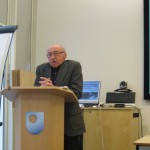 The History of the OU Project was pleased to host a successful one-day forum What have we learnt? Transmitting knowledge, facilitating learning on 29 November. With papers from academics from a variety of traditions this event enabled educationalists, educational technologists, historians and adult education practitioners to gain new perspectives on the OU and the wider development of the HE sector since 1945.
The History of the OU Project was pleased to host a successful one-day forum What have we learnt? Transmitting knowledge, facilitating learning on 29 November. With papers from academics from a variety of traditions this event enabled educationalists, educational technologists, historians and adult education practitioners to gain new perspectives on the OU and the wider development of the HE sector since 1945.
A Senior Research Fellow in IET at the OU, Martyn Cooper, attended the event and swiftly told his colleagues, ‘Today I attended the excellent “What have we learnt? – Transmitting knowledge, facilitating learning c1960-2010” seminar organised by the History of the OU project’. His blog posting is here http://martyncooper.wordpress.com/2011/11/29/what-have-we-learnt-transmitting-knowledge-facilitating-learning-c1960-2010/
Read the rest of this entry »
Posted in Events, History of the OU | No Comments »
Posted on November 17th, 2011 at 11:20 am by Daniel Weinbren
Shortly to be published is Devin Orgeron, Marsha Orgeron (pictured) and Dan Streible (eds.) Learning with the Lights Off. Educational Film in the United States, OUP, 2011. This is about film’s educational uses in twentieth-century America. Illustrated with over 90 illustrations of rarely seen educational films, the publisher suggests that this collection of essays examines ‘some crucial aspect of educational film history, ranging from case studies of films and filmmakers, to analyses of genres, to broader historical assessments’. It also suggests that there will be links to many of the films.
For historians of the OU this could be of interest as Harold Wilson was influenced by the owner of Encyclopaedia Britannica Films, William Benton. Walter Perry argued that Benton was one of the men whose vision of education for all, through correspondence teaching and the use of the mass media, contributed to the decision to found the Open University. An advocate of radio, in the 1950s Benton toured the world with his films arguing that ‘the cold war between the open and closed societies is likely to be won in the world’s classrooms, libraries, and college and university laboratories’. He also sponsored tours of the USA taken by Wilson. In return Wilson sought to help Benton to overcome his ‘problem’ concerning the British quota on the number of foreign films which could be shown. For Benton and Wilson widening access to knowledge, business and politics could all advance together.
Posted in Images, Methods | No Comments »
Posted on November 4th, 2011 at 11:26 am by Daniel Weinbren
 Fred Gray (a speaker on the 29th November forum) has edited a new book, ‘Making the future. A history of the University of Sussex’. This beautifully-illustrated account of the first fifty years of the university (1961-2011) consists of chapters by almost 70 different authors. Here are the voices, and the varied and well-presented images, of former and current staff and students. Their narratives are framed by Fred Gray’s introductions his overview and his account of continuing education (the field in which he became a professor).
Fred Gray (a speaker on the 29th November forum) has edited a new book, ‘Making the future. A history of the University of Sussex’. This beautifully-illustrated account of the first fifty years of the university (1961-2011) consists of chapters by almost 70 different authors. Here are the voices, and the varied and well-presented images, of former and current staff and students. Their narratives are framed by Fred Gray’s introductions his overview and his account of continuing education (the field in which he became a professor). The theme of the liberalism of the sixties and seventies runs through the book as does the engagement with the distinctive and original curriculum. There are some parallels to be made with the OU, the influence of Asa Briggs on both places being one of them and the ‘early leavers’ scheme is another. One might also compare it to the University of Twente (founded 1961 as the first campus university in the Netherlands it insisted that engineers study social sciences) and it also influenced Kent, Lancaster, UEA, Stirling, Essex, York and Warwick. Read the rest of this entry »
Posted in BBC, Higher education, History of the OU, Methods | 1 Comment »
Posted on November 3rd, 2011 at 3:46 pm by Rachel Garnham
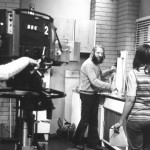 The History of the OU project would like to wish the BBC a happy 75th birthday – for over half its life, and for the entirety of the OU’s existence, there has been a strong partnership between the two organisations which continues to this day.
The History of the OU project would like to wish the BBC a happy 75th birthday – for over half its life, and for the entirety of the OU’s existence, there has been a strong partnership between the two organisations which continues to this day. 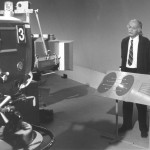
For the first thirty-five years, course broadcasts were made on TV and radio. The first programme was broadcast in January 1971, a clip of which is available on the History of the OU website. Latterly there have been co-productions, right up to the present day with the new Symphony co-production between the BBC and the OU. For each of the four episodes, OpenLearn will feature an article from a member of the OU’s music department, extending the scope of the series. Read the rest of this entry »
Posted in BBC | No Comments »
Posted on November 1st, 2011 at 5:34 pm by Daniel Weinbren
Born in Lithuania in 1858 Eliezer Ben-Yehuda, (originally Eliezer Yitzhak Perelman) moved to Jerusalem, married and tried to raise his son (born 1882) to speak only Hebrew. At this time there was only a limited vocabulary in the language but Ben Yehuda campaigned and from 1882 the language was taught in some schools. In 1884 a Hebrew newspaper was started. In 1918 a stone was laid to ceremonially show that there was to be a university in British Mandate Palestine and in 1925 the Hebrew University of Jerusalem was opened. The name reflects how language is often defended through universities. Read the rest of this entry »
Posted in Higher education, Nations and regions | No Comments »
Posted on November 1st, 2011 at 2:43 pm by Daniel Weinbren
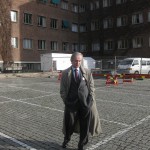
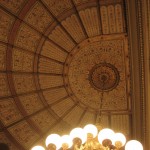 The conference was a delight. We convened in one of the older parts of the university pictured in this report. There we heard a fascinating welcome talk from John Peter Collett, Professor at the University of Oslo and then Mitchell Ash, Prof of Modern History, Vienna presented a keynote on ‘Universities, science, scholarship and national identity’ and there was a contribution from Benjamin A Elman, Professor of East Asian Studies and History, Princeton who gave a paper entitled: ‘Why was the scientist in Chinese Universities call ‘Mr Science’ based on Japanese universities?’ A theme running through all the contributions was that of national identity. This postings title comes from John Peter who explained the centrality of the University of Oslo to Norway. Many universities provide training for the elite administrators of the state or church but also embody national and often regional pride. It was only when the talks had concluded and we were filing out, some of us with rather numb due to the unforgiving wooden seats, that I snapped the ceiling. Read the rest of this entry »
The conference was a delight. We convened in one of the older parts of the university pictured in this report. There we heard a fascinating welcome talk from John Peter Collett, Professor at the University of Oslo and then Mitchell Ash, Prof of Modern History, Vienna presented a keynote on ‘Universities, science, scholarship and national identity’ and there was a contribution from Benjamin A Elman, Professor of East Asian Studies and History, Princeton who gave a paper entitled: ‘Why was the scientist in Chinese Universities call ‘Mr Science’ based on Japanese universities?’ A theme running through all the contributions was that of national identity. This postings title comes from John Peter who explained the centrality of the University of Oslo to Norway. Many universities provide training for the elite administrators of the state or church but also embody national and often regional pride. It was only when the talks had concluded and we were filing out, some of us with rather numb due to the unforgiving wooden seats, that I snapped the ceiling. Read the rest of this entry »
Posted in Events, Higher education | 2 Comments »
 The recent announcement to staff at the OU that current economic frameworks indicate that the OU needs to market itself is a reminder that the OU has always been in the marketplace, and that it has long had an interest in sustaining popularity. For many years other state-funded universities did not feel any need to compete. Until the era of grant-funding these institutions selected young people who often studied at the university near their homes. Even after grants were provided many universities felt little need to prove themselves worthy either to the public at large or the politicians.
The recent announcement to staff at the OU that current economic frameworks indicate that the OU needs to market itself is a reminder that the OU has always been in the marketplace, and that it has long had an interest in sustaining popularity. For many years other state-funded universities did not feel any need to compete. Until the era of grant-funding these institutions selected young people who often studied at the university near their homes. Even after grants were provided many universities felt little need to prove themselves worthy either to the public at large or the politicians.







